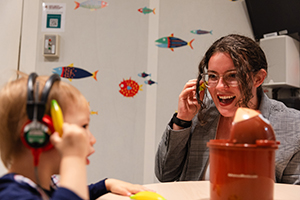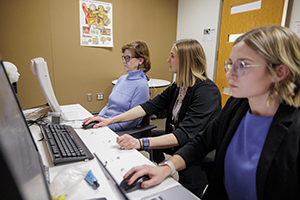The power of communication: Exploring a career in communication sciences and disorders
Are you fascinated by how people communicate? Do you like solving puzzles or have a knack for problem-solving? If you answered yes to these questions, you might want to consider pursuing a degree in Communication Sciences and Disorders, also referred to as CSD! This degree program and its related career fields are all about empowering people to connect and express themselves.
Explore what communication sciences and disorders looks like at CMU.
What is Communications Sciences and Disorders?
Communication isn’t just about talking – it’s about understanding what you read and hear and being able to speak, write or use gestures or devices to interact with others. It’s hard to imagine being unable to share your ideas, communicate your thoughts, or understand what the people around you are saying – or even to enjoy a meal without difficulty. However, for many people, this is a reality.
There are several things that can lead to communication disorders, including but not limited to:
- Developmental delays
- Physical disabilities
- Brain injuries and strokes
- Hearing loss
- Neurological diseases and disorders
- Environmental elements
- Factors at birth
- Aging
Communication Sciences and Disorders is the field of study and practice dedicated to understanding, diagnosing and treating problems related to communication disorders. It focuses on the science behind how we produce sound, form words, hear and listen, understand language, and more. It even considers how to improve the physical acts of eating, drinking and swallowing. Communication Sciences and Disorders professionals work with people of all ages to help them live in the world more fully and comfortably.
What's it like to major in Communication Sciences and Disorders?
A Bachelor of Science (B.S.) or Bachelor of Arts (B.A.) in Communication Sciences and Disorders is the first step to working in this helping profession. CSD is considered an interdisciplinary program, meaning you’ll be taking classes in several subject areas. In this field of study, you'll dig deep into subjects like:
- Biology and Anatomy - You’ll begin to understand how the brain, mouth, throat and ears work together for communication.
- Psychology – You’ll learn about human behavior and development, and how communication impacts a person's emotional and social life.
- Language Development – You’ll explore how children learn to speak and understand language, and what happens when that process is delayed or interrupted.
- Phonetics and Acoustics – You will learn about speech sounds – how they're made, how they travel through the air, and how we hear them.
- Neuroscience – You’ll gain an understanding of the brain's role in communication.
- Disorders of Speech, Language and Hearing - You'll learn about some of the specific challenges people face, such as stuttering, difficulty making certain sounds, language delays, voice disorders and hearing loss.
- Clinical Observation - Your program may offer opportunities to observe real-life therapy sessions, giving you a peek into what the job is actually like.
Is Communication Sciences and Disorders a hard degree program?
Any college degree program requires hard work, and CSD is no exception. Some people consider the classes challenging because they include the study of complex scientific and psychological topics. You'll need to be good at:
- Critical Thinking - Considering individual people’s unique situations, analyzing information, and figuring out the best ways to help someone navigate their challenges.
- Empathy and Communication - Working closely with people who are experiencing communication challenges requires compassion, emotional intelligence and good interpersonal skills.
- Memorizing - Reading and remembering a wide range of scientific terms, including about human anatomy and types of disorders.
You’ll need to do some serious studying, but most universities offer great academic support systems that include academic advising, tutoring, study groups and more.
A bachelor's degree in CSD typically takes four years to complete, just like most other undergraduate degrees. You'll usually take general education courses in your first couple of years, then dive deeper into CSD-specific courses in your junior and senior years. Some program even offer opportunities to get involved in CSD-related research and clinical experiences.
It is important to remember that while a bachelor's degree in CSD gives you an amazing foundation, it's considered a "pre-professional" degree. This means that to become a certified professional in most CSD careers (like a Speech Language Pathologist or Audiologist), you'll need to go on to graduate school.
What kinds of jobs can you get with a CSD degree?
This is where it gets exciting! While some careers in CSD require a master’s degree or higher, a bachelor’s degree will still open doors to numerous opportunities. With a bachelor's degree in CSD, you could consider roles like:
- Speech-Language Pathology Assistant (SLPA) - Work under the supervision of a licensed Speech-Language Pathologist, helping with therapy activities and administrative tasks.

- Audiology Assistant - Like an SLPA, audiology assistants help audiologists with hearing tests and other related tasks.
- Early Intervention Specialist - Work with young children and their families to support development, including communication skills.
- Paraeducator/paraprofessional - Work in school settings to support children with varying needs related to communication, or with individuals with disabilities in a variety of home and community settings.
A CSD degree also provides a fantastic foundation for other graduate programs like education, special education, counseling, social work, and public health. If you choose to pursue a CSD- related graduate degree, you would also be eligible for careers like:
- Speech-Language Pathologist (SLP) - SLPs diagnose and treat communication and swallowing disorders. Often called “speech therapists,” they may work in schools, hospitals, rehabilitation centers, private practices, and other community centers. They might help a child learn to speak clearly, an adult regain language after a stroke, or
someone with a swallowing disorder eat safely. - Audiologist - These professionals specialize in hearing and balance disorders. They test hearing, diagnose hearing loss, fit hearing aids, and work with people of all ages who have hearing difficulties. They often work in clinics, hospitals, or private practices.
How much do people with a CSD degree earn?
Careers in Communication Sciences and Disorders can vary greatly depending on your degree level (undergraduate or graduate) and the career path you choose. However, most CSD-related careers have good salaries. For example, the median pay for Speech-Language Pathologists last year was $95,410, according to the Bureau of Labor Statistics , and the median pay for audiologists was $92,120 in the Occupational Outlook Handbook. Both career paths have a faster-than-average growth outlook within the next decade.
What's the difference between Communication Sciences and Disorders and Speech-Language
Pathology?
Communication Sciences and Disorders (CSD) is a broad academic field of study. It's the name of the degree program you'd pursue at the undergraduate level. It encompasses all aspects of human communication, including speech, language, hearing, and swallowing. CSD explores both normal processes and disorders. 
Speech-Language Pathology (SLP) is a specific profession within the larger CSD field. A Speech-Language Pathologist is a professional who has earned a master's or doctoral degree in CSD and is licensed to diagnose and treat communication and swallowing disorders.
Should I pursue a degree in Communication Sciences and Disorders?
If you're looking for a career where you can genuinely make a difference in people's lives by combining science with compassion, a degree in Communication Sciences and Disorders might be for you. Imagine helping a child say their first words or supporting a parent as they regain their ability to speak with their family after a serious injury. These are the moments that make a career in CSD incredibly rewarding. It's a field that's all about unlocking voices and creating connections.
Communication Sciences and Disorders at CMU
Central Michigan University is a national leader in Communication Sciences and Disorders. CMU is home to the nation’s longest running audiology program, which was ranked 29th nationally and first in the state of Michigan by U.S. News and World Report. Students at the undergraduate and graduate levels have incredible opportunities to gain hands-on experience in the field through programs like the Summer Speech-Language Specialty Clinics and patient care clinics in the CMU Carls Center. Students can even participate in Study Abroad programs focused on CSD-related activities. Explore CSD programs at CMU by visiting the Communication Sciences and Disorders program page.